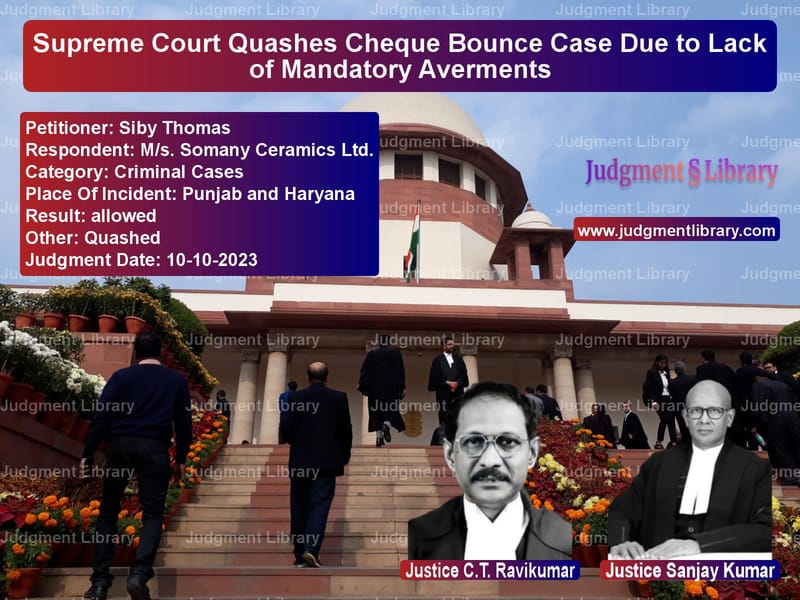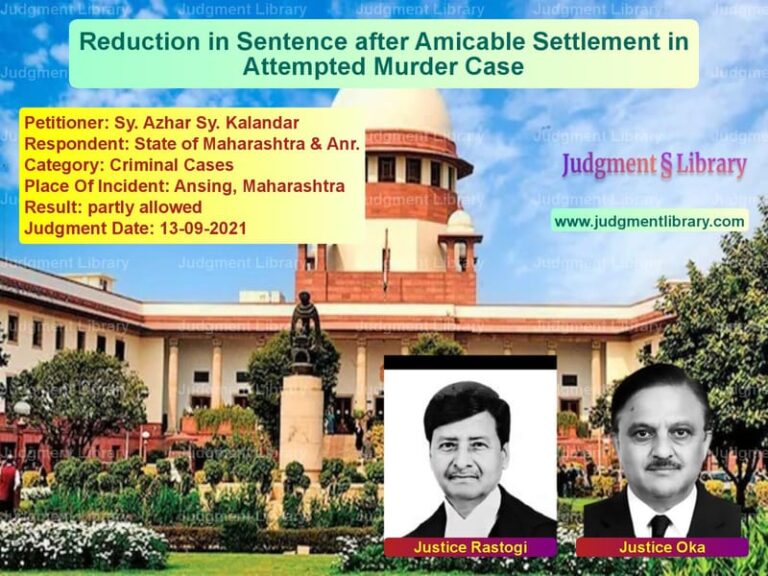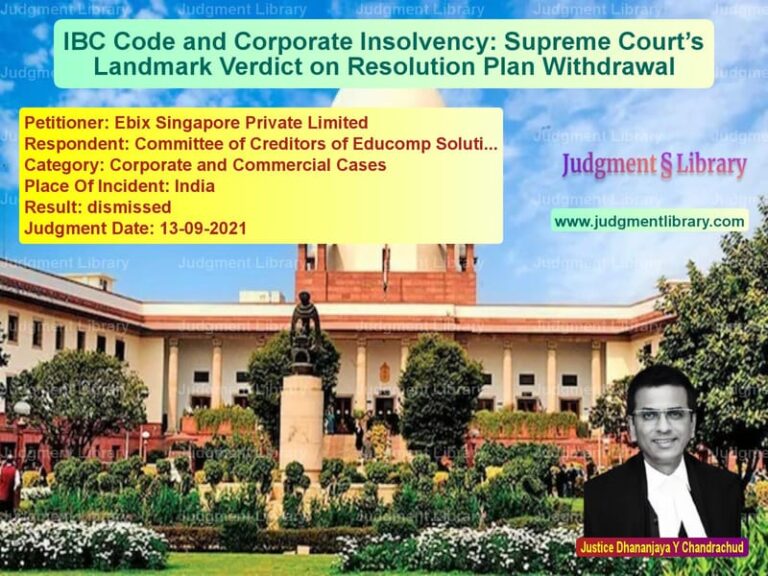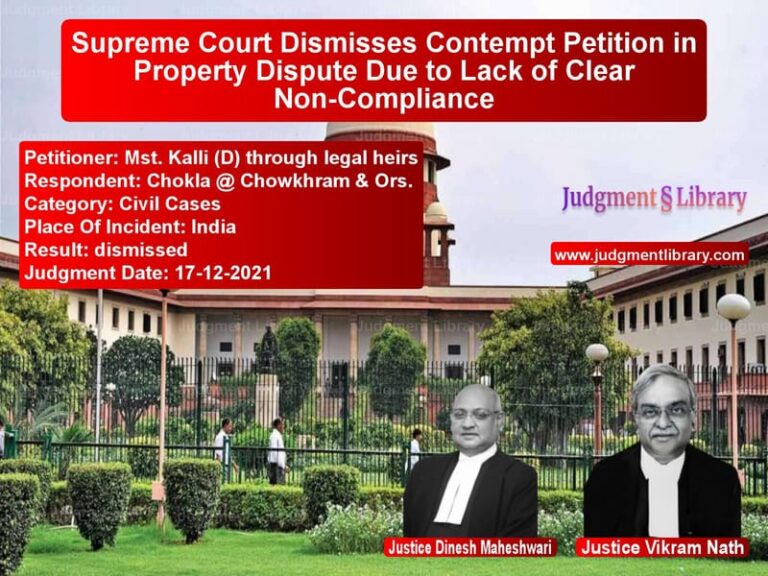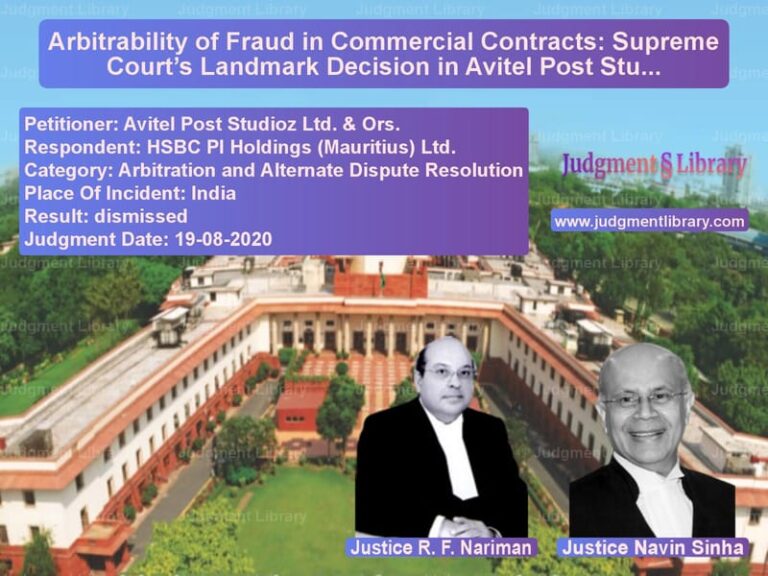Supreme Court Quashes Cheque Bounce Case Due to Lack of Mandatory Averments
The Supreme Court of India recently delivered a significant judgment in Siby Thomas vs. M/s. Somany Ceramics Ltd., addressing the legal intricacies of cheque bounce cases under the Negotiable Instruments Act, 1881 (NI Act). The ruling focused on the vicarious liability of a partner in a partnership firm accused in a dishonored cheque case, emphasizing the necessity of proper legal averments in such complaints.
Background of the Case
The dispute arose when M/s. Somany Ceramics Ltd. filed a complaint under Section 138 read with Section 141 of the NI Act, alleging that a cheque issued by M/s. Tile Store (Accused No.1) was dishonored due to insufficient funds. The complainant named all partners of the firm, including Accused No.4, Siby Thomas, holding them liable for the firm’s financial obligations.
Siby Thomas challenged the complaint, arguing that:
- He had resigned from the partnership firm on May 28, 2013, while the cheque was issued on August 21, 2015.
- The complaint failed to include mandatory averments as required under Section 141(1) of the NI Act.
The Punjab and Haryana High Court rejected his plea, stating that the issue of his retirement was a matter of evidence and needed to be established in trial. The accused then approached the Supreme Court.
Key Legal Issues Before the Supreme Court
The Supreme Court examined the case on two primary grounds:
- Whether an accused partner can be prosecuted if he had retired from the firm before the issuance of the dishonored cheque.
- Whether the complaint fulfilled the mandatory requirements under Section 141(1) of the NI Act to establish vicarious liability.
Arguments by the Petitioner (Siby Thomas)
Siby Thomas argued that:
- He had resigned more than two years before the cheque in question was issued.
- The complainant did not specify his role in the firm’s financial decisions or prove his involvement in issuing the cheque.
- The complaint lacked explicit averments stating that he was in charge of and responsible for the conduct of business at the time of the alleged offence.
- Past Supreme Court rulings had established that general statements about a partner’s liability were insufficient for prosecution.
Arguments by the Respondent (M/s. Somany Ceramics Ltd.)
The complainant countered that:
- The complaint sufficiently stated that all partners, including the petitioner, were responsible for the firm’s daily operations.
- Determining whether the petitioner had retired before the cheque was issued was a matter of trial and not for summary dismissal.
- The case should be governed by the principle that a complainant may not always have direct knowledge of the internal workings of a partnership.
Supreme Court’s Key Observations
The Supreme Court closely analyzed the requirements of Section 141 of the NI Act, which deals with the vicarious liability of directors and partners in cheque bounce cases.
1. Lack of Specific Averments in the Complaint
The Court held that the complaint failed to meet the statutory requirements of Section 141(1). The judgment stated:
“Mere mention that the accused was a partner is not sufficient. The complaint must clearly specify how and in what manner the accused was responsible for the conduct of business at the relevant time.”
The Court cited Anita Malhotra vs. Apparel Export Promotion Council and Gunmala Sales Pvt. Ltd. vs. Anu Mehta, reinforcing that vague and general allegations do not satisfy the legal standard for prosecuting an individual.
2. The Significance of the Resignation Before Cheque Issuance
The Court found merit in the argument that the petitioner had resigned from the partnership before the cheque was issued. It ruled:
“Once an individual ceases to be a partner, he cannot be held liable for transactions conducted by the firm thereafter unless specific evidence shows his continued involvement.”
The judgment emphasized that criminal liability under Section 138 NI Act is strictly tied to the individual’s role in decision-making at the time of the offence.
3. The High Court’s Error in Refusing to Quash the Case
The Supreme Court noted that while High Courts have discretion in quashing complaints, they must do so when a case prima facie lacks merit. The ruling stated:
“The High Court ought to have exercised its powers under Section 482 Cr.PC to prevent the abuse of the legal process. The absence of essential averments warranted the quashing of the complaint.”
Final Judgment
Based on these findings, the Supreme Court ruled:
- The Punjab and Haryana High Court’s order was set aside.
- The complaint against Siby Thomas was quashed, and no further proceedings could be initiated.
- The ruling reaffirmed that partnership liability is not automatic; it requires clear evidence of involvement in the firm’s affairs at the time of the alleged offence.
Implications of the Judgment
This decision has far-reaching consequences for business law and cheque bounce cases:
- Strengthening Protection Against Frivolous Litigation: Accused individuals cannot be prosecuted without specific allegations establishing their liability.
- Ensuring Accountability in Business Transactions: The judgment clarifies that vicarious liability applies only to those actively managing business operations at the time of the offence.
- High Courts’ Role in Preventing Legal Misuse: The ruling reminds High Courts to exercise their powers judiciously when reviewing cases under Section 482 Cr.PC.
Conclusion
The Supreme Court’s decision in Siby Thomas vs. M/s. Somany Ceramics Ltd. is a landmark ruling that strengthens procedural safeguards in cheque bounce cases. By reiterating the need for precise legal averments and recognizing the impact of prior resignations, the judgment reinforces the principles of fairness and justice in business litigation. This ruling will serve as a guiding precedent in similar cases where individuals are wrongfully implicated in financial disputes.
Petitioner Name: Siby Thomas.Respondent Name: M/s. Somany Ceramics Ltd..Judgment By: Justice C.T. Ravikumar, Justice Sanjay Kumar.Place Of Incident: Punjab and Haryana.Judgment Date: 10-10-2023.
Don’t miss out on the full details! Download the complete judgment in PDF format below and gain valuable insights instantly!
Download Judgment: siby-thomas-vs-ms.-somany-ceramics-supreme-court-of-india-judgment-dated-10-10-2023.pdf
Directly Download Judgment: Directly download this Judgment
See all petitions in Fraud and Forgery
See all petitions in Bail and Anticipatory Bail
See all petitions in Judgment by C.T. Ravikumar
See all petitions in Judgment by Sanjay Kumar
See all petitions in allowed
See all petitions in Quashed
See all petitions in supreme court of India judgments October 2023
See all petitions in 2023 judgments
See all posts in Criminal Cases Category
See all allowed petitions in Criminal Cases Category
See all Dismissed petitions in Criminal Cases Category
See all partially allowed petitions in Criminal Cases Category

